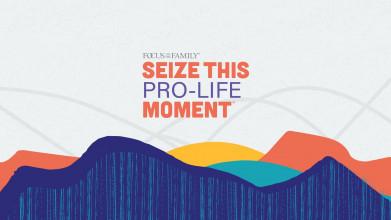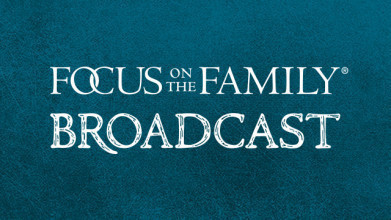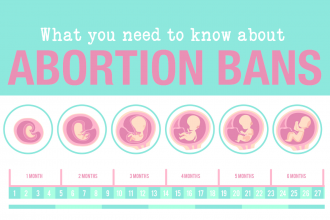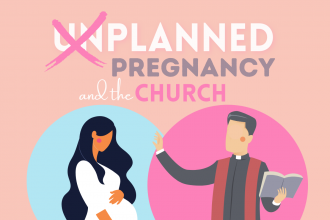Preview:
Jim Daly: Well, welcome to Focus on the Family. I’m Jim Daly, here in the studio on Friday, recording this, uh, for you to hear on Monday. Uh, we’ve just learned this morning the news of the historic announcement from the Supreme Court, that has overturned Roe V. Wade. That’s after 49 years and 63 million children, um, not here today because of abortion. Um, no court has the right to deprive a child of the right to live, and I think that’s been surfacing over the years, especially with technology that shows that this is an individual human being. Somehow, they wanted to convince you it’s just a clump of cells up until the ninth month, and then boom, out comes a baby. That is a baby from the beginning, and this has been the debate, can we take innocent human life because of its inconvenience? And the answer is no, and today the court has agreed with that. Now, this decision has really just pushed it back to the states. Uh, I don’t know what you’re going to hear from the pro-abortion community, but the radical position that they take, that this somehow is going to prevent a woman in a blue state, for example, to get an abortion, is just not true. It does create the opportunity for the Christian community to set up in red states, blue states, to help women. And that will be the plan going forward, and Focus is going to be involved in that. Uh, also, the support of pregnancy resource centers around the nation. Uh, we work closely with them, and we are grateful for their hard work as well. Today, I’ve invited two good friends, scholars, to join me and talk about this decision, it’s impact. Uh, I have on the phone professor Helen Alvaré and Dr. Al Mohler. Professor Alvaré is a law professor at George Mason university, where she teaches family law, law and religion, and property law. Dr. Al Mohler is an evangelical leader, serving as the president of the Southern Baptist Theological Seminary, and he’s an esteemed authority on these issues, and a former Focus on the Family board member. Professor Alvaré, Dr. Al Mohler, thanks for being with us here at Focus.
Professor Helen Alvaré: Thank you so much.
Dr. Al Mohler: It’s good to be with you.
Jim: Well, we’ve, uh, recorded with both of you before on legal and theological issues, and I just so appreciate two leading thinkers, uh, giving us time to talk this through. Helen, let me start with you. Uh, explain to our listeners what the Supreme Court ruling on the Dobbs case means, and how does it affect abortion policy going forward?
Professor Alvaré: Prior to Dobbs, in 1973, and Roe, and then repeated in 1992 in Casey, the Supreme Court had held that the constitution’s fourteenth amendment, the word liberty, contains a right to abortion, throughout nine months, and for any reason. When the constitution protects that right, that means states cannot impair it. So states were essentially banned from protecting unborn human lives.
Jim: Hmm.
Professor Alvaré: As of today, the court says that Casey and Roe, and I think I can use this word (laughs), are nonsensical. That they’re not even legal reason (laughs), according to the Dobbs majority opinion. They were a mess. Uh, confusing, unworkable, wrong about the text of the constitution, about the history of the law in the United States, and about the prior cases they claimed to rely on. So as of today, moving forward, every state is permitted, once again, to make laws about abortion. Some will protect it, some will protect unborn human life, at least some or all times during pregnancy.
Jim: Well, I so appreciate that reference to nonsensical, because I think on the pro-life side, that’s been the claim all along. It’s hard to defend women when half the abortions are women.
Professor Alvaré: That’s true.
Jim: (laughs). You know, that are, uh, the abortion’s being done against. Dr. Mohler, let’s get you in here. Uh, I so appreciate you making time for this. You’re one of our leading theologians in this country. Uh, professor Alvaré obviously is bringing that legal perspective. How are you feeling today with the news of Roe being overturned?
Dr. Mohler: Well, Jim, you know, well, we’ve been working at this for a very long time, so I have to put this within the context of God’s mercy, and- and just say this is the day the Lord has made. We will rejoice and be glad at it. Uh, as a Christian, we understand this is the beginning of an even bigger battle, but we’ve, by God’s grace, earned the right to enter those battles. At, uh, the- the congressional level, where it will undoubtedly have to be fought out, and at all 50 states. But, uh, I appreciate you so much, professor Alvaré on this, and- and, you know, the- the reality is that Justice Scalia got right to the heart of the issue when he wrote that, uh, from the day Roe V. Wade was handed down, it was on a collision course with the constitution.
Jim: Right.
Dr. Mohler: And, you know, as Christian theologian, and- and as a- a constitutionalist, I just want to point out that every wrong method of, uh, of treating the scripture has a parallel and a wrong method of, uh, dealing with the constitution. And, you know, liberal theology has, uh, has basically abandoned the, uh, scripture, and- and liberal jurisprudence saw it basically to abandon the constitution. The majority of the court pulled us right back to the text of the constitution, and for that, we should be very thankful.
Jim: That is good. And it’s, uh, again, to your point, it’s a day to rejoice. The work is not over. That’s one of the concerns I’ve had. This simply puts it back in the hands of all the states. So if you think about the spiritual battleground, now it goes from a federal level to a state level. And boy, we as the Christian community, really have to redouble our efforts to help women, to help, uh, the men involved in their lives as well as the children, so that I would hope eventually, uh, even if the Congress tries to, uh, develop a law that gives a woman the right to an abortion in the future, that this event will create the desire not to do that. That the immorality of taking a child’s life because of finances or whatever, that it’s never worth it to murder a child for the benefit of that person’s future. So, uh, let me talk a bit about that, uh, to both of you, and you both can respond, the negative reaction. We’re taping this on Friday. We’re going to be airing it today, Monday. Um, not sure what’s going to take place over the weekend. You have Jane’s Revenge and these other groups that are threatening, uh, you know, to do damage and to riot, which seems to be their only means of expression, unfortunately. Uh, let me play a clip from Speaker Pelosi, and get your reaction to her.
Speaker Pelosi: This morning, the radical Supreme Court is eviscerating American’s rights and endangering their health and safety. But the congress will continue to act, uh, to overcome this extremism and pro- extremism and protect the American people. Today, the Republican controlled Supreme Court has achieved their dark, extreme goal of ripping away a woman’s right to make their own decis- reproductive health decisions. American women today have less freedoms than their mothers. With Roe and their attempt to destroy it, radical Republicans are charging ahead with their crusade to criminalize health freedom.
Jim: Um, Al, let’s go to you first. Your response to that rationale, that this is an extreme moment, that the judges are extreme. How do you react to that?
Dr. Mohler: Well, they’re so extreme they’re in line with, uh, 187 years of American jurisprudence before Roe V. Wade. In other words, the- the- the progressives, uh, and this great cultural divide, I think it- and just assuming they’re honest, they honestly believe that human rights are, uh, are- are invented by human beings, to be politically negotiated to whatever extreme you can politically get away with. And then, uh, you know, their- their understanding is that history is unfolding, so the- the next thing you know, uh, from abortion, LGBTQ rights, especially the T and all the rest, uh, don’t forget the plus sign at the end of that. This is a court decision that just effectively refutes, uh, the entire logic of their case. So, I guess, predictably, they’re pretty upset.
Jim: Right. And I think, Helen, for me, that use of the word extreme, it- it seems odd that for us, the pro-life community, trying to preserve life, encourage a mother to get through her pregnancy, to make the right decision, a decision she’ll never regret, in my opinion, um, that- that somehow, we’re the extremists because we don’t support the killing of children. Maybe you can explain that to me? You’re in Washington.
Professor Alvaré: (laughs).
Jim: You hang out at the dinner parties.
Professor Alvaré: Oh, yeah.
Jim: How- how is that?
Professor Alvaré: That is a political partisan statement. That is- and it’s so far removed from the question of the humanity, that mother and that child (laughs), in a- an abortion facility. It is so far removed from the opinion itself, which is a product of 49 years of fabulous scholarship. The pro-life movement didn’t sit around and stamp its feet and say, “You’re so bad. Why can’t you see the unborn child as valuable?” They wrote books and had symposia and wrote a amicus briefs and- and scholarly articles. And this is the fruit of them, and they’re true. To actually say truthful things like, if liberty, in the constitution is the American experience, and all the laws that were passed in the states, and what they show about who we are, then a country that banned abortion for 200 years (laughs) doesn’t include it as a liberty. Wow, reason. Reason and truth are beautiful. And that opinion, if you read it with- with that view, um, is that. And I just- I feel happy because I saw something true, and because someone is actually reading the constitution as if it was the people’s document, and it doesn’t just belong to five Justices.
Jim: Yeah. So, so good. Uh, Dr. Mohler, let me turn to you. You recently cited new data from the Guttmacher Institute, that indicates abortion has been on the rise in recent years, after a 30-year decline. In fact, the New York Times reported in 2020, that one in five pregnancies were ending in abortion. That’s a shocking number. Uh, how- how do you think the court’s decision will impact those numbers? Are we going to see fewer abortions, obviously, or will these blue states that, like Colorado, I’m sad to say, our home state, they’re- they want to be an abortion tourist destination. So what do you- what do you think the outcome will be?
Dr. Mohler: Well, in one instance, I think we’re going to find ourselves in two Americas, but it’s going to be more like three. And, uh, so this is my analysis. I- I- I think there are others who would clearly agree with it. Uh, there are some deeply blue states, uh, Illinois, Rhode Island, uh, California, uh, Massachusetts, uh, you know, that- that are going to be abortion destinations. I mean, Gavin Newsom from California’s talking about paying women to come to California to have abortions paid for by the state. You go to a state like Alabama, it’s the opposite. State like Mississippi, from which the Dobbs case came. Uh, or- or, uh, a state like Louisiana, where even a democratic governor actually voted for, uh, a restriction on abortion just to recent days.
Jim: Hmm.
Dr. Mohler: So those are two different Americas. But there’s a third America, and that third America, uh, includes states, and I’d put Colorado a bit there, uh, where, uh, it’s still possible to look at potential restrictions on abortion, but we’ve got a long way to go to get to, uh, any elimination of abortion. One thing we can do, we can be there to foster children, adopt children, do whatever we can to help mothers in crisis. And so the political battles, it’s going to be very uneven. And I- I do divide it into that trio, the- the deep blue states, that I think may get even bluer, the deep red states that may get even redder in that sense. And then, uh, at least, uh, uh, somewhere between 10 and 20 states, where this is going to be an ongoing battle from year to year. But I- I don’t want to take too much time here, but the bigger issue, I think, uh, the president today, and, uh, speaker Pelosi made very clear that they want to push for national legislation. And ultimately, I think both sides know that’s where the big debate will head.
Jim: Right. And Helen, from a legal perspective, when you look at that, that’s kind of what the court has often said, especially the originalist, the court should not get involved in these deep social issues. The legislative branch should determine a law, and if possible, pass that law. Then it will be challenged, and then the court will look at it to say is that law that Congress passed, is it constitutional? That’s kind of how the government is supposed to work. And this is one of the difficulties that we’ve had, where the progressives have used the court often to get laws through… in essence, get laws through, through court decisions. Is that fair?
Professor Alvaré: Yes, but I- I want to sound a note of hope, and it is about the feds. States have legislative authority that’s called the police power, any law for health, safety, welfare. They used to also say morals, but that kind of went by (laughs).
Jim: Yeah (laughs).
Professor Alvaré: So any law in that area, the states can do. The federal legislative branch, article one of the constitution gives supposedly pretty limited powers to a federal congress. Most were reserved to the states. The feds can do things like interstate commerce, you know, raise and support an army, tax and spend, take care of federal lands. So they can’t actually pass a law that just says abortion is legal in the 50 states, because it doesn’t fit any of those article one powers. But here’s what they can do, and you’ve seen them do. They can claim that something they’re doing affects interstate commerce. Oh, abortion affects interstate commerce, we’re going to make a law about something on abortion that affects interstate commerce. We’re going to give federal money to the states, but not unless you allow unlimited abortion. We’re going to let federal contractors build planes, um, you know, supply healthcare, but not if you don’t provide free abortion for all your employees. We’re going to make sure that every federal land has an abortion clinic on it. They’re going to go nuts with the article one powers they have. They can’t straightforwardly legalize abortion in the 50 states, but they can use all these article one powers-
Jim: Huh.
Professor Alvaré: … and they can slip through various, you know, supposed limits in them. And- and again, think of how what a sick agenda this is. Instead of all the things this country needs right now, we’re going to be- take our article one powers and slip abortion in wherever we can. Again, when you think about the abortion process itself, it’s a sick agenda.
Jim: And it’s so dismaying in that regard. Let me, uh, Dr. Mohler, you mentioned President Biden. And again, uh, to Helen’s point, uh, you know, this is a moral issue in the public square. Plenty of people, uh, are upset. Uh, if- if you lean toward that direction, we get it, you don’t need to write us, we understand that. You think it’s a political issue. We disagree. We think it’s a moral issue in the public square, that’s why we fight it. It’s also why I recorded for our See Life event, uh, a piece with former democrat, Dan Lipinski, from Illinois, who’s a pro-life Catholic, and he lost his seat because he wouldn’t budge being a pro-life democrat. So I get it, we’re in the fight every day. I understand it. I wish it weren’t political. I wish there were more democrats that were pro-life. But pointing now to President Biden, and a clip that we got from today, his speech, I wanted to play this and get both of your- your responses.
President Biden: Make no mistake, this decision is a culmination of a deliberate effort over decades to upset the balance of our law. It’s a realization of an extreme ideology and a tragic error by the Supreme Court, in my view. The court has done what it has never done before, expressly take away a constitutional right that is so fundamental to so many Americans, that it had already been recognized. The court’s decision to do so will have real and immediate consequences. State laws banning abortion are automatically taking effect today, jeopardizing the health of millions of women, some without exceptions. So extreme that women could be punished for protecting their health. So extreme that women and girls who are forced to bear their rapist’s child.
Jim: Al, let me- let me go to you on the response first, uh, because one of the things that I’ve seen when I’m engaging the pro-abortion community, they go to this 1% of- of rape. Uh, so 1% roughly of abortions occur due to rape. And the- the other 99%, 98% of abortions is more of a birth control decision. They have an unwanted pregnancy. So if you could just elaborate on that for a minute, you know, trying to prove the normality through the extreme. You know, the- the- it’s always rape, in their minds.
Dr. Mohler: Yeah. Yeah, you know, this is where the argument was made by the Feminists in the late sixties and the early seventies, some of them going so far as to argue that, uh, like Andrea Dworkin, that, uh, you know, any- any martial act is an act of rape (laughs). Uh, uh, but basically, uh, it- it’s an effort to try to deny how abortion actually happens in this country. And the vast number of abortions is performed simply because a woman no longer wants to be pregnant. And- and then, you know, the- what are presented as the hard cases of rape, incest, uh, you know, et cetera. But, uh, you know, every state, regardless, uh, frankly, of- of exactly how the law is framed, there- there are ways of legal re- redress. There are- there are judges and- and others who can deal with issues of extremity. But, you know, I’m- I’m just thankful the American people, at least millions of Americans have seen through that kind of argument.
Jim: Absolutely. And that- that’s really the point to use that extreme to explain the other 98%, 99%. Dr. Mohler, let me ask you, uh, you- he used the word child. He’s kind of breaking from the ranks. Democrats always refer to the preborn child as a fetus, a blob of tissue, et cetera. He seems to be consistently referring to the baby in the womb as a child. Uh, I’m not sure that he understands he’s not speaking from the talking points, but, um, in that regard, have you noticed that?
Dr. Mohler: Yep. Uh, it’s a moral reflex, isn’t it? I mean, this is, uh, the- this is creation of order, natural law. Uh, just the- the Imago Dei showing up, and the fact that, uh, we- we eventually just have to acknowledge that it’s not just a moral truth held by pro-lifers, it’s a moral truth period, that the inhabitant of the womb is an unborn child, a- a- a human being made in the image of God. And that’s the word child pops out. Remember, they’ve been trying to get away from talking about pregnant women.
Jim: Huh.
Dr. Mohler: Uh, they’ve been trying to talk about pregnant people, because of the transgender revolution, and the White House actually, you know, has a style guide that says you’re supposed to talk about pregnant people. But, you know, when you’re going after voters, you don’t go after pregnant people, you go after voting women. So, uh, I just- I just found that very interesting. Uh, we just need to keep a script and- and keep a memory on this.
Jim: Yeah. Helen, it’s right at the end here, so I- I just want to ask kind of- kind of an open question to you. As you’re a law professor, um, what do you think the future is? What would you encourage both the Catholic church and the Protestant church, what do we do? How do we move forward? Uh, how do we get into discussions with people? (laughs). Um…
Professor Alvaré: Yeah. I’ll make one broad point. Obviously, I think all of the effort to welcome women being able to bring children into the world and to make them feel that they- they can do justice to the child, justice to their financial necessity (laughs), et cetera. Crucial. But I think that the right of abortion has been sold on the right of autonomy. The right just to make my own decisions, whatever. I think that reinstating the idea that we are in relationship first, we are first God’s children, and then we are brothers and sisters to one another. And that we owe one another. I do think that all of those things are going to have to be theologically and morally and philosophically and culturally affirmed. Autonomy is going- is going to be help that we can provide if we don’t do that.
Jim: Yeah. Dr. Mohler, let me pitch this to you and get your response. And same open question, how do we move forward? But I was at a pro-life event not long ago, a woman was on the podium, and she said, you know, the Judeo-Christian ethos is that Christ showed us that we were to love the Lord our God, with all of our heart, soul and mind, and to love our neighbor, and that the greatest sacrifice a person could make is to lay their life down for another. And she turned that on the abortion issue and said, now we are asking the baby to lay its life down for the mother. And it- it’s a real twist on the Christian ethic of how you give and sacrifice, to where it becomes somewhat selfish. And I know these women are in difficult circumstances, and Helen’s right, we’ve got to do all we can to help them, but that idea that you terminate the life of a baby because of financial difficulty or something like that. My mom was in that spot. She thought about aborting me. And I’m so thankful I was born to a poor, white family, in Compton, California. You know, I was able to climb out. And who has the right to say to somebody, you can’t live because you don’t have enough in your bank account. How more absurd could a country become?
Dr. Mohler: You know, Jim, the gift of life, it- it- I think it’s just deeply theological. It’s intuitive, because God made us in his imagine. So actually, people who wouldn’t even claim any religious identity, I think, uh, clearly the vestige of that moral knowledge is there. But, um, you know, in a society that’s increasingly secularizing and, uh, and I think professor Alvaré is exactly right, you know, worshiping autonomy, uh, abortion becomes almost sacramental. The gift of life is consistent throughout any civilization that survives. Uh, you know, the- the understanding that every single human life is precious and is to be defended.
Jim: Mm-hmm.
Dr. Mohler: And, uh, abortion is not just about the numbers of babies aborted every year, it’s about the moral corruption of the American heart and mind.
Jim: Mm-hmm.
Dr. Mohler: In such a way that makes all life diminished and expendable and contingent. And, uh, so I just look at this today and I say, look, I- I- I believe the final word, uh, has to be praise and honor to God, who vindicated his own truth, his own glory and his own gift of life, uh, in- in- in this decision today. And, uh, for that, I’m just very grateful. We-we’ve got to turn to a bigger battle tomorrow, and that battles joined. But I really thank God for the- the wonderful gift of this decision today.
Jim: Yeah. And in that, uh, spirit, Al, could I ask you to just end this time together. I’m so grateful, Helen, for your time out of Washington, and for you, Al, traveling on the road in Chicago. Um, could I ask you to pray for this country? Pray for those that don’t see it our way and pray for us to do the job that needs to be done.
Dr. Mohler: Yeah. Um, it would be my great honor, Jim. Thank you. Dear heavenly Father, we come in the name of the Lord Jesus Christ, uh, to recognize you as the author and giver of life and all good things. Father, we thank you for the gift of life. We thank you for this Supreme Court decision today. We thank you that you care about the- the- the ways that human beings and human societies organize themselves. We’re thankful that you’re- you’re not distant from history. But Father, we claim this for your glory today, as a vindication of- of the sanctity of human life. And Father, we recognize the limits of a society that denies you and recognizing anything as ultimately precious and infinitely worthy and- and indeed sacred. But Father, we pray for those women who right now may be struggling with abortion. We pray for those who may be outraged at this decision. Father, I pray that somehow the truth may break through to some of them, that they’ve been holding on to an argument that simply is not credible and does not honor you. Father, I pray that your church will be shown to be faithful, in ministering to women and others in need. Father, I pray that we will show the world what it means to welcome every single life, every single life, regardless of age, condition. A status of life in such a way that we honor you by honoring life. And Father, I just pray that your people will show up faithful, and we pray for your providence and grace to this nation, even in coming days with threats of violence and all the rest. Father, we commit all this to you, thanking you for the honor of having this conversation today, and just looking forward to the battle ahead. And, uh, Father, may we as Christians recognize that if it’s worth fighting, it’s because the battle is the Lord’s. It’s in the name of the Lord Jesus Christ that we pray. Amen.
Jim: Amen. Dr. Mohler, uh, thank you for that prayer, and I hope that the Lord answers every bit of it, uh, especially, uh, opening the eyes of those who don’t see abortion the way we see it. And, uh, we are here at Focus going to continue to fight for that preborn child. You know, the way we’ve done that the past 18 years is through Option Ultrasound. We’ve equipped pregnancy resource centers with 3D, 4D ultrasound machines. And by doing so, we know that it costs $60 to save a baby’s life. We’ve, uh, hit almost a half a million babies saved through that program. And I want to invite you, at this moment in our culture, to be a part of the solution. As we move forward, we’re going to continue to save children and help women. And one of the ways you can do that today is your statement, that I’m going to stand for life, is to provide a $60 gift for Focus, so that we can together save a baby’s life. Uh, Jean and I do it every month, and that’s something we’ve committed to. Maybe you would consider that as well. The bottom line is, we’re going to have to do so much more as we move forward. It’s not just the ultrasound solution, but we are going to get engaged with pregnancy resource centers to help them be the hero in their community. Hopefully through job training and job placement for these women, and maybe their boyfriends or husbands, so we can help them not only make the right decision for life but lead them into a relationship with Jesus Christ. Wouldn’t that be great? And we’re looking forward to the Lord using this opportunity to not only lift up the, uh, great value of life, but to kind of bring Shalom, God’s peace, to these families that are in chaos. And to do so, you can contact us here at Focus on the Family. Call 1-800-232-6459. That’s 1-800, the letter A, and the word FAMILY. You can also go to our website at focusonthefamily.com/broadcast for all the details. And from everyone here at Focus on the Family, let’s praise the Lord together for the answer to this 49-year struggle with Roe versus Wade. God bless you.























